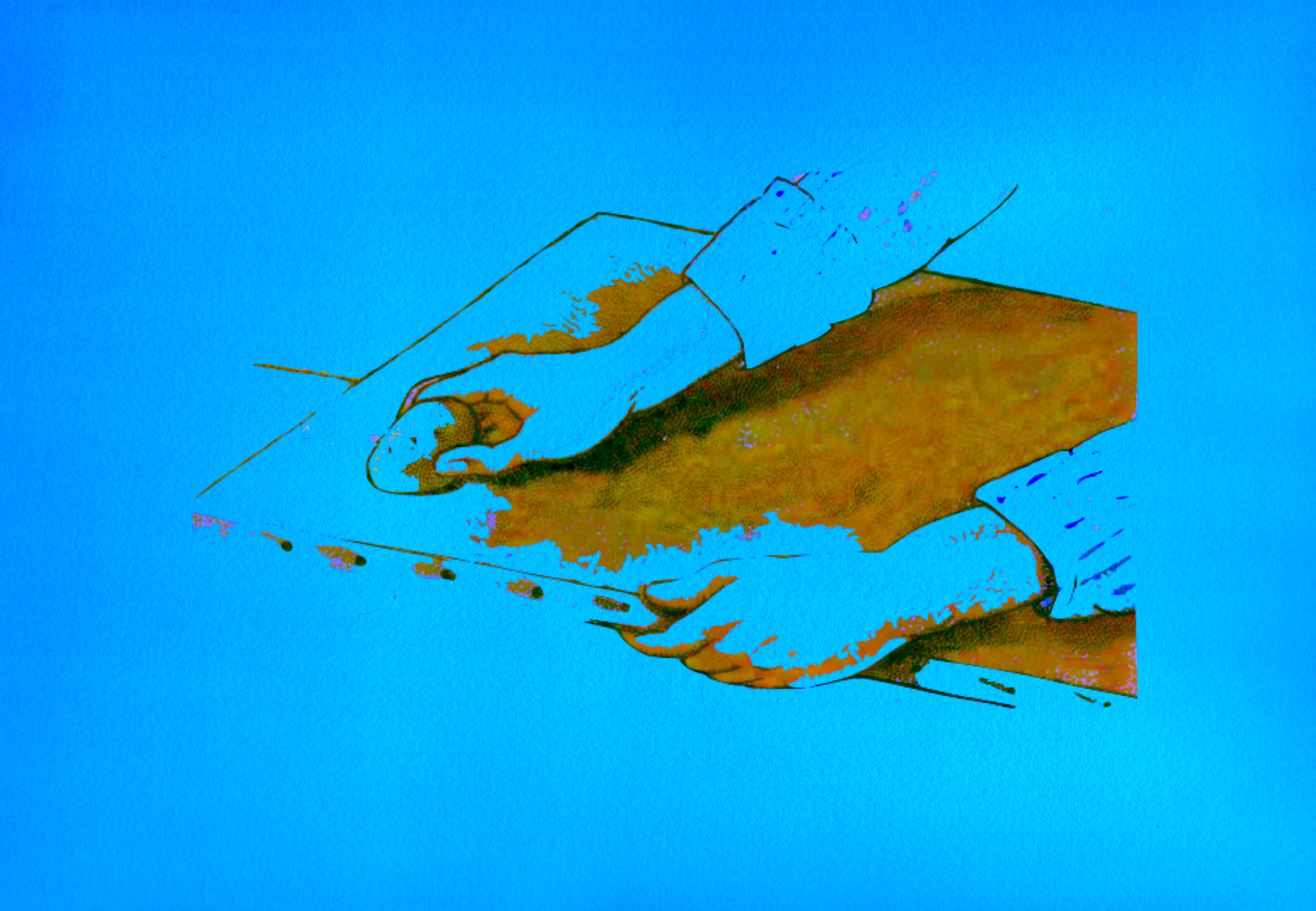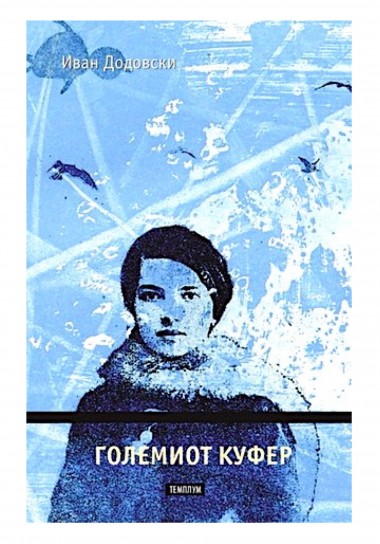
Прозорецот
Сега ни погледот низ сивото стакло не можам да го смирам. Улицата надвор вреви. Деноноќно тече по Рузвелтова времето во кое немам дел. Останав затворена во куќата, сама од себе побегната, избезумена. Еве и мигрената ми се обновува. Часовникот бие десет. Саботна раздвиженост надвор и отсуство на движење во мене. Лежев до девет часот во креветот, потем станав и сварив кафе. Се вратив со шолјата под простирката, загледана некаде, во нешто, во ништо… Сега гледам низ прозорецот, но ништо не препознавам. Ме погодува растрчаноста, чувствувам прав на усните и мирис на автомобилски гасови. Окото ми го прострелуваат шарените бои на нови автомобили што минуваат како во сон. Ден за пазарување, си велам, луѓето купуваат, купуваат, купуваат… Летото сѐ уште упорно се измолкнува од под асфалтот и пеколно ме удира во слепоочниците. Господи, ако вака треба да се помине секој преостанат викенд од животот, тогаш подобро да ги склопам очите сега, помирено и барем без страв… Луѓево трчаат некаде, како избезумени мравки. Онде под дрворедот безизразно врват две жени, едната постара, а другата средовечна. Отспротива автомеханичарот работи легнат под нов џип. Подолу, кај Институтот за фолклор, покрај самата ограда од дворот, контејнерот потскокнува скокоткан од брадест Циган. Неговите боси стапала висат угоре како кикиришка на петел, а главата – сигурна сум – ги намирисува во дното на контејнерот трошките од хедонистичката трпеза на моите соседи. Каква упорна потрага за утрешниот семеен неделен ручек…
Од другиот крај на улицата се доближува млада жена со дете во количка, бавно ја поттурнува, потем припазува на автомобилите, ја преминува улицата и се губи зад аголот. А детето? Ах, не можам да видам, син, девојче? Можеби спие среде вревата, правот, гасовите, горештината? Мртвороденче што не ќе се разбуди??? Прекини, се прекорувам. Прости ми, му велам на бебето, го свртувам погледот надолу… Педесетина метри подолу, пред новата куќа на аголот се собираат десетина луѓе, потем влегуваат во куќата. Ах, сум заборавила, адвентистите… Денес е сабота. Се вселија тука пред две години, велат дека дошле од Америка. Делеа летоци, агитираа од врата на врата, мајка ми ги нарече нововерци… Ме запрепасти пред некој ден мазното лице на нивнот пастор, кое се залепи на мојата врата и рече директно Госпоѓо, дали сте спасена?…
Албумот
Останав сама. Дали е доцна да се почне нешто одново со моите четириесет и две години? Толку сум уморна од напрегање по среќата… Тој замина… Можеби сум виновна јас, поради неупорноста, нетрпеливоста, повлеченоста во себе… Кој ќе ја бара сега грешката? Балкански мажи, навикнати на доминација, потиснати од промените и баспарицата, нервозни што џебот им е поплиток од машкото его. Не, не ќе го поднесев тој однос, дури и да се обидев да поправам нешто… А потем дојде и таа, помлада, ненаситна… Мажите побудалуваат како деца по петнаесет години брак, ги фаќа нов пубертет, младешка ведрина, некое ново разлистување на силите и мислат дека со тоа ќе се потисне сета фрустрација на средните години. Но, тоа е само кратко, како нестварност, а потем пак соочување со секојдневието, здебелување на телото, немоќ и, од ден на ден – право кон челуста на староста…
Еве го алубумот. Да прелистувам слики или да не прелистувам? Колкупати само ги прередував откако тој замина да живее кај неа… Да ги горам, или да ги трошам вака, во саботна здодевност, прелистувајќи ги додека не избледат. Еден ден ќе ги положам во кутија сосема излижани, побелени и стари. Ќе го затворам мојот живот како збришана глетка, како да не постоел…
Ова е венчавката. Мајка ми стои до мене, се смее, радосна е, а побожноста ѝ се гледа на лицето. Татко е некаде зад неа, една ситна фигура. Јас благо се насмевнувам, дури и замислено, под проѕирниот, краток превез на шапката. Еве го и него, стои со погледот кон мене, пресно избричен, насмевнат, дотеран, со долги јаки на кошулата … Ги вртам фотографиите… Некогаш патувавме, беа поинакви времиња, верувавме дека живееме во најубавата социјална држава, маршалот нѐ водеше кон светла иднина… Летувањата на Јадранот, па дури и евтините вина и мрсните јадења во Будимпешта, потем тивка прошетка низ Верона… Сето тоа некогаш, со него, во социјализмот, тој беше директор на мало државно шумско стопанство, а јас секретарка во управата за јавни приходи… На кредит го купивме плацот за куќата, потем ја градевме… Татко се пензионира, ѝ се придружи на мама, која никогаш не ја напушти грижата за куќата… Се живееше некој пристоен, среќен живот… Само едно ме боли, го слушав татко како скришно разговара со мама, немаат деца…
Празник?
Со мајка седиме на масата. Полека, со трепет на раката, мајка срка од супата. Одвај ја препознавам во староста, се повлече и таа во молк, движењата сѐ повеќе ѝ се губат под товарот на непознати мисли… Понекогаш ја гледам како наутро застанува на работ од старата спална, рачно изработена од стар мајстор за првата брачна вечер со татко… Стои така на работ, одвај подисправена, со овиснати гради, но беспрекорно чиста во ноќницата и бела во косата… Го спушта полека чешелот надолу покрај ушите како да ги чешла годините… Јас ѝ носам чај, а таа ништо не ми вели…
Осум години, ми вели мајка додека ѝ ставам парче пржена риба во чинијата. На утрешен ден, точно осум години. Јас молчам. Таа ме потсеќа на смртта на татко, не дозволува да заборавам нешто важно, а јас почнав сѐ да заборавам… Знае да ми каже само неколку зборови и да ми ги врати сликите на минатото, ме убива понекогаш со тоа, ама мајка не може без таквиот спомен, дури и да е болен… А јас, пак, бледеам, сакам сѐ да се избриши од моите сеќавања, минатото ми е јарем, а сегашшноста… Јадам од рибата. Се трудам да не мислам. Таа ме погледнува, небаре со прекор. Да, се согласувам со неа, сликите мора да се оживеат одново, споменот да се оживее за да биде втиснат како нов печат во секојдневицата... Татко почина од срцев удар, ненадејно, го најдовме оптегнат на фотељата, прекриен со дневниот весник преку лицето. Не престана да се грижи за дневната политика сѐ до смртта, и покрај прекорите на мајка. Тогаш, во тие немирни времења, паѓањето на Федерацијата и социјализмот за него значеше почеток на неизвесноста. Не ми станаа до ден-денес јасни неговите русофилски идеи, со кои го исполнуваше домот за време на заедничните ручеци во домот… Ја урнаа Русија на колена!, емотивно ми повторуваше, со тага, со потиснат бес… Новото што ние го дочекавме за него беше мрак, непоимливост, опасност. Затоа веројатно побрза да замине за да не го дочека непознатото…
Утре е празник, вели мајка, ќе одам в црква и на гроб. Никогаш не сфатив како остана во неа ревноста за споменот, верата и сета таа спокојност низ времето… Ги помни празниците, а во мене не остана ни една трага од деновите што таа ги нарекува празници, Богородични, Господови, на светителите… Не можам да се присетам кој празник е утре, не сакам да прашам за да не ја повредам… Таа спокојно ја привршува рибата, најпосле се прекрстува. Почнувам да ѝ завидувам, иако не ја сфаќам, не знам во што се состои нејзиниот ред, спокојството, на ја сфаќам нејзината потпора... Она што таа го верува за мене е непознато, туѓо… Јас не можам да помислам на тоа, главата ми се претрупува со грижа за сметките, сакам понекогаш да ѝ кажам дека пензијата што таа ја наследи од татко и мојата бедна службеничка плата не стигаат да се врзи крај со крај… Ама, ништо не ѝ велам… Јадеме евтина супа, евтина риба, штедам, прикрпувам, а таа знае сѐ и без да ѝ соопштам… Молчиме… Да, ме фаќа бес, мачнина, во главата ми се вртат бесмислени зборови, слепочниците ми клукаат… Господи, да помине денов и овој хаос, си велам… Станувам, ја раскревам масата. Мајка заминува во нејзината соба за да одмори.
Олтар
Мислам дека нешто мора да преземам, да средам нешто. Ми се раѓа сево ова време некоја неодолива желба да подредувам нешто… Ама каде да се почне? Ќе морам нешто да сторам, што побрзо, што побрзо, пред да се срушам мртва… Знам, ќе ја суредам куќава, ќе проветрувам, правот ќе го бришам. Почнувам. Првин со правосмукалката, во дневната соба. Одам во спалната, ги вадам сите работи од ормарот. Во горниот ормар чуваме стари работи. Ги разгледувам, ги двојам. Старите работи што не ми требаат ги тргам на страна, а другите ги враќам назад. Го затворам ормарот. Така. Прозорците се отворени, некој сончев зрак косо паѓа во собите од куќата… Денот си оди и јас морам да ја средам куќава додека е време, додека имам уште сили…
Излегувам на улица, одам кон контејнерот за да ги оставам старите алишта и работи. Сигурно ќе ги земе некој. И оддеднаш, глетката ме поразува… Покрај контејнерот, еден куп луѓе… Доаѓаат, оставаат стари работи, немо заминуваат… Редицата луѓе… Купишта стари работи… Местото станува некој олтар, очите ми затреперуваат, изгледа дека ќе заплачам, ама немам солзи, ги гледам лицата на луѓето, безизразноста…
Се враќам дома, мајка спие, не можам ништо да ѝ кажам… Седнувам на столчето пред тоалетата, се погледнувам во огледалото… Да, си велам, не само јас, сите средуваат… Нешто мора да се преземе, да се подреди, еднаш ова мора да заврши, овој хаос, оваа мачнина… Ама телово… Сѐ поуморно ми е телово, постаро… Звуците во куќава се притајуваат, заоѓа денот, аглите од собата немо ме гледаат и боите од куќата гинат полека во една сеопшта празнина…
